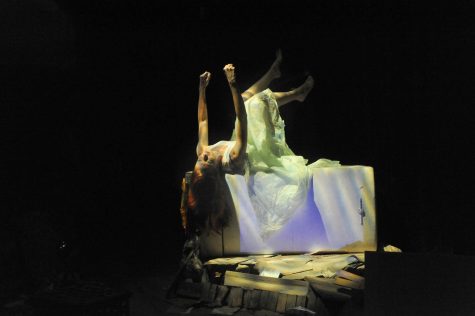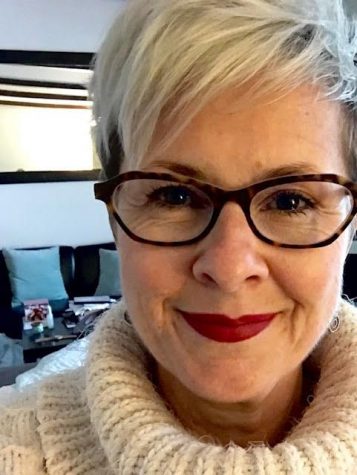Gleason Bauer’s Moment Workshop explores the dynamics of space
October 15, 2020
Although mainstage shows are the most visible, students at Whitman create theatre in a variety of ways, from classes to clubs to workshops. Gleason Bauer creates and educates about theatre as well as on anti-racism, and during the first two weekends of October, they worked with Whitman to create theatre through their virtual Moment Workshop.
According to Bauer, moment work was developed by the Tectonic Theater Project, best known for their play The Laramie Project. Moment work, said Bauer, takes all of the elements of theatre and lets people experiment with them before putting it back together.
“Basically… the workshop gives participants an opportunity to experiment and play around with each element of the theatre before then trying to bring them all back together,” said Bauer. “It also puts… all the things that make meaning inside theatre into the hands of everyone in a non-hierarchical fashion.”
Emily K. Harrison, who also creates and educates about theatre, is the founder and Producing Artistic Director of a theatre company in Colorado called Square Product Theatre, where Bauer is the Associate Artistic Director. Harrison was originally slated to direct a show at Whitman this fall, with Bauer as a guest artist, but after the cancellation of the majority of the fall season, the department instead held onto Bauer’s workshops for whomever wanted to participate.
Harrison explained that she was glad that the department decided to move forward with the workshops, even after the cancellation of the show.
“It’s a really great way of making theatre and it’s… in no way anything new or innovative. It’s just quantified in a way that’s easy to understand,” said Harrison. “[It] makes the tools of theatre a little more egalitarian and allows people to actually play around with different elements they don’t normally necessarily get to be directly involved in.”

Harrison also added that she felt the tools students gained from the workshop would be useful to them in the future.
“Part of the reason I was interested in having Gleason come in is because the moment work is a less traditional way of making theatre, and so it’s really good for the students to… have some exposure to that and have that tool in their toolbelt when they go out into the professional world,” explained Harrison.
Bauer explained that these workshops usually take place in person; so, the ones they ran at Whitman were modified to fit the online format. Laura Hope, the Chair of the Department of Theater and Dance, attended the first of these online workshops.
“I was really impressed with the way Gleason adapted moment work for the internet,” said Hope. “It was fun and inspiring and it was nice to see people playing together and separately to think about new ways to do what we do.”
According to Bauer, one of the first things they do in person is explore the space together, and that takes on a slightly different shape online.
“The first elemental piece of our space is our screen; this is now our stage,” said Bauer. “So we spent time looking at the language of film, in the sense of what a shot is, because the shot now becomes our moment. It’s an uninterrupted piece of film.”
Bauer explained that they would spend time looking at the different types of shots before moving into more traditional theatrical work. Bauer also talked about layering in theory and the philosophy as the group discussed the moments.
“It’s not just as simple as making moments, but we start analyzing them: What is the difference between what is happening within the moment structurally, versus what we’re perceiving,” said Bauer.
They used an example of a performer peering through a hole before stepping back in order to gain perceptual analysis of the story. For example, perhaps the audience perceives that the performer stepped back because they were surprised by what was behind the door.

“What we learn is that there are certain structures that tend to create a kind of consensual perception,” said Bauer. “So, what this does is it helps the theatre-maker to become increasingly articulate in structure, so they understand what it is that’s making meaning, and that then gives them greater agency within their own meaning-making.”
Eva Sullivan, a senior theatre major and music minor, attended the first weekend of workshops. She explained that it was helpful to her to discuss as a group how they created moments.
“[We] talked about… what we saw in the moment… and what it made us think of, and what the story might be,” said Sullivan. “It was good to think about the distinctions between what your audience is literally seeing and… all the different things they might gather from that.”
Jay Tyson, a senior theatre and film & media studies double major, was another participant during the first weekend. Tyson explained that they appreciated the exploratory aspect of the workshops.
“What’s great about these workshops is that we explored what makes a moment, scene or show memorable without focusing specifically on acting, design or other elements we usually focus on,” said Tyson. “It was all about the connection between the audience and all of the elements of a piece and working together to play with those elements in order to find what bits and pieces stood out as viewers.”
Although the workshops were slated to happen on Oct. 3, 4, 10, and 11, only the first three took place. Although the students enjoyed the workshops, many felt that it was too exhausting to be on Zoom for 4 hours straight.
“We don’t really have weekends as students. We have to get ahead on our homework or catch up on our homework; so, it was hard to have a whole morning or afternoon of working on homework and then another four hours on Zoom,” said Sullivan. “So, that was really hard, and it’s sad to not continue with it… but it was really nice to do something creative just for the sake of doing something creative.”
Sullivan also explained that Bauer was very supportive when she and another friend reached out to explain why they wouldn’t be able to do the second weekend.
Hope also expressed that while online theatre can be enjoyable, it’s hard to compare to the real thing.
“As a theatre person, I think the absence of live theatre has made us appreciate theatre all the more, and how special and fragile the world of live performance really is,” said Hope. “Internet theatre makes me miss the real thing that much more. It’s hard to explain, but there truly is something magic about live performance.”
Overall, Hope, Bauer and the students said that they enjoyed the workshops, and Bauer said that they appreciated getting to know the Whitman students a little better. It can be difficult to make connections or be creative in these times, and workshops like these help.





